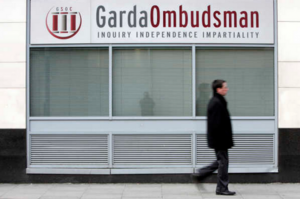Office of the Garda Síochána Ombudsman Commission on Abbey Street Upper, Dublin
Further to the Garda Síochána Ombudsman Commission accessing journalists’ phone records as part of investigations into alleged leaks to media, the Irish Council for Civil Liberties has created a ‘handy guide to phone number snooping powers’.
It explains…
Is GSOC allowed to gain access to this information under Irish law?
Yes. Both the Gardaí and investigators with GSOC can access phone records and other personal information, if it is needed to assist them with an investigation of a possible crime. In this instance, GSOC has the same powers to investigate the Gardaí as the Gardaí would have if they were investigating anyone else on suspicion of an offence.
How? In what circumstances?
The key here is that a Garda who leaks confidential information could be guilty of an offence. Under section 62 of the Garda Síochána Act 2005, it is an offence to disclose information received in the course of duties as a Garda if the Garda knows that the information is likely to have a “harmful effect”. This includes, for example, information that is published and relates to the victim of a crime or a witness to a criminal trial, or leads to a serious infringement of a person’s right to privacy (as well as other issues).
The same piece of 2005 legislation (section 98) gives members of GSOC the same powers as Gardaí if they are investigating a potential offence.
And, since 2011, Gardaí have the power to access phone records (Communications (Retention of Data) Act 2011).
It follows that, because GSOC investigators are looking at a potential offence – the leaking of confidential information – they also have the power to access personal records, including those of third parties like journalists.
Sounds a bit like Big Brother. Is there no protection for our right to privacy?
Yes there is, but it’s weak.
GSOC investigators would have to get sign off by one of the three members of the Garda Síochána Ombudsman Commission. That’s all.
How about authorisation from an external body? I thought there was “judicial oversight”?
No, both the Gardaí and GSOC can obtain sign off for these powers without referring to any external body.
A judge does not need to give permission for these records to be obtained.
However, a judge reviews the access requests made by State agencies and gives a report to the Taoiseach, at least every year. The judge can also investigate cases.
Also, if you have reason to think that your data has been requested by the Gardaí, GSOC or other State body, you can make a complaint to the “Complaints Referee”.
Do GSOC and the Gardaí have other powers to gather private information?
Yes, since 1993, the Gardaí have had a lawful power to intercept telephone calls and, since 2009, to engage in hidden surveillance. In 2015, both of these powers were also extended to GSOC investigators.
Again, the privacy safeguards surrounding these activities by GSOC and the Gardaí are weak.
What about protection of journalists’ sources?
A journalist’s right to protect sources or, journalistic privilege, is a key pillar of the freedom of the press. This is protected under Article 10 (freedom of expression) of the European Convention on Human Rights (ECHR) and has been acknowledged formally as a constitutional principle by the Supreme Court in Mahon Tribunal v Keena and Kennedy. This does not mean that journalists can never be forced to reveal their sources, but any order to do so must be proportionate, and subject to strict oversight, for example by a judge.
What does the ICCL think should happen now?
We agree with the Minister for Justice and Equality that there needs to be a full review of all of these powers. That review must be independent, transparent and use human rights standards around data protection and privacy as key benchmarks. Particular attention should be paid to the case law of the European Court of Human Rights under Article 8 (right to privacy) of the European Convention of Human Rights, as well as relevant case law of the European Court of Justice. The recommendations must be published and acted upon promptly, with a clear implementation schedule.
Cabinet to discuss GSOC access of journalists’ phone records (RTE)
Previously: They Snoop To Conquer
Mark Stedman/Rollingnews.ie


